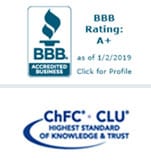The bad news: for too many Americans, retirement planning is what puts the “tired” in being retired. The good news: it doesn’t have to be this way. To help get you started, we compiled a list of the top five retirement planning questions we hear from our clients and handed it to Roger Cowen, chartered financial consultant, certified life underwriter, and president of Cowen Tax Advisory Group. Here’s what he had to say:
1. How do I create a retirement plan?
First, determine your fixed expenses and potential income. This is Point A, where your finances are now. Next, list lifestyle goals, creating a bucket list of things you want to achieve during retirement. This is your Point B, where you want your finances to go. With this in mind, draw up a retirement roadmap outlining the best way to get from Point A (current situation) to Point B (goals).
Find a financial advisor you can trust, who listens and brings information and options you may not be aware of to the table. Implement your plan and review it annually. Coordinate your retirement plan with your taxes and estate planning, so you can go into your retirement with peace of mind.
2. How can I make sure I will have sufficient income in retirement?
There are two ways to secure sufficient income in retirement. One way is to find a guaranteed income that will last as long as you live. Usually, this is accomplished through an annuity that guarantees a lifetime income. The second way means increasing the “life” of your retirement savings account by withdrawing no more than 3-4% per year.
At Cowen Tax Advisory Group, we make this visible to our clients through a software program called Road to Wealth. We go on our big-screen T.V. and put your name in lights—everyone likes to see their name in lights. We plug in your budget, inflation, rates of return, and the software calculates how long your money will last. Usually, this builds confidence that you’re good to go into retirement and won’t run out of money.
3. What should I do with my 401(k) from a previous employer?
Usually, when someone retires, they take their 401k, put it in a suitcase, label it “Rollover IRA,” and walk out the door with it. They do this for two reasons: 1) better and wider investment choices and 2) tax benefits for the family.
I recommend that you sit down with a trusted financial advisor and review the rule of 100, a rule of thumb that was developed while Elvis was still singing Jailhouse Rock and Ray Charles was putting out his first LP. The rule of 100 isn’t hard and fast, but it may provide some old-fashioned wisdom. Try it for yourself: write down the number 100 and subtract your age. The difference is the percent of your assets that you should have in the market. The other portion of your money is safe out of the market providing principal guarantee. As a Libra, I believe in a balance between the two.
4. Do I need to plan for long-term care?
As long you can say with absolute certainty that you won’t experience the frailty of human health, you do not need to plan for long-term care. Of course, no one can say this with certainty because health, like everything else in life, changes over time. If you’re single, widowed, and childless, the question is: who will take care of you when you experience the frailty of human health? If you have a family, the question is: should you require care, who will provide it? How will this affect family dynamics and where will the money come from?
After 40 years sitting on my side of the desk as a financial advisor, I’ve realized that I was raised with the notion that how you play the game of life is important. You’ve got to play fair and be a good sport. How you leave the game—how you leave your family—is equally important. Since the frailty of human health is inevitable, it is prudent to plan for it, and the consequences of not planning for it can be catastrophic.
5. Should I include legal services in my retirement planning?
At the very least, your retirement planning should include these legal document.
1. A will. A will states your intentions and outlines how you want your assets to pass after your death.
2. Power of attorney. In the event you are incapacitated, power of attorney appoints someone who can make legal and financial decisions on your behalf.
3. A living will. Unlike regular wills, living wills state what kind of medical intervention you are willing to accept during your final days.
Additionally, if you want to avoid probate court or have a family member with special needs, you should explore a trust. A trust will help minimize the red-tape and hassle of probate and, if you have a child with special needs, it will prevent any of your child’s inheritance from going to the state. Ideally, the legal side of your retirement planning should be in-step with the financial side to avoid unnecessary confusion and expense.
Still have questions? Call us at (860) 676-1100 or email Judith@cowentaxgroup.com for a free consultation.




